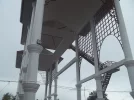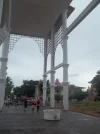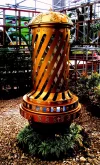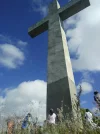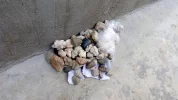Trailhawk
The Pilgrim
- Time of past OR future Camino
- 2022: Camino del Norte + Primitivo + Finisterre
Cebu is a province found in Central Philippines. It has seven cities and 46 municipalities. Three of the towns has their patron saint as St. James the Apostle (the Greater). One of the towns is called Compostela. It hosts the Archdiocesan Shrine of Santiago de Compostela, established in 1865 by a Spanish priest from Zaragoza, Spain. The parish has relics of St. James obtained in the past and just recently.
There are three routes of this camino: 1. Around the rural areas of Compostela which is 28+ kilometers and walked for 2 days; 2. From the town of Sogod to Compostela which is 65+ kilometers long and walked in 5 days and; 3. From the town of Badian to Compostela which is 175+ kilometers and walked in 10 days. These may sound easy but is not.
The Camino de Santiago (Camino Cebu) here was established in July 2017 and was first walked for ten days by the then parish priest of Compostela, Fr. Scipio Deligero, and eight pilgrims. I was the guide. After that, word got out and local pilgrims, especially those who cannot afford travel to Spain, walked this Asian equivalent of the Camino de Santiago. Youngest is 5 years old and the oldest at 81 years old.
Compostela and its parish hosted the 2nd National Congress of St. James the Greater Parishes and Devotees last February 2019. One of those who came was Msgr. Elizardo Temperan Villaverde of the Cathedral of Santiago de Compostela, Spain and he brought with him a relic of St. James and a document known as a "spiritual bond of affinity". It states that what plenary indulgences you receive in completing the Camino de Santiago in Spain is the same as doing it here and vice versa.
You may obtain a credencial from the Archdiocesan Shrine of Santiago de Compostela at Php1,500 (27.44 euros) and may include a statue of Sr. Santiago, a scallop and a certificate of finish signed by the Archbishop of Cebu. You may contact their office at 6332 425-8746. The parish is currently under the helm of Msgr. Ildebrando Leyson.
Basically, this is a poor man's camino. The length of days is carefully followed since the terrain and the climate here plays a big role in how you maintain your pace and your stamina. Besides that, there are no directional signs and albergues. Pilgrims are welcomed to sleep and dine in the mountain parishes. A little donation would help greatly these remote parishes. This is a camino that is still in its unadulterated form reminiscent of the medieval years.
To work your way around and to successfully complete your journey, it is recommended that a local guide be hired. The parish would contact one for you.
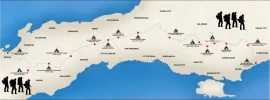
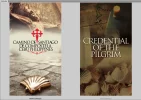

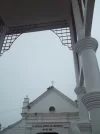
There are three routes of this camino: 1. Around the rural areas of Compostela which is 28+ kilometers and walked for 2 days; 2. From the town of Sogod to Compostela which is 65+ kilometers long and walked in 5 days and; 3. From the town of Badian to Compostela which is 175+ kilometers and walked in 10 days. These may sound easy but is not.
The Camino de Santiago (Camino Cebu) here was established in July 2017 and was first walked for ten days by the then parish priest of Compostela, Fr. Scipio Deligero, and eight pilgrims. I was the guide. After that, word got out and local pilgrims, especially those who cannot afford travel to Spain, walked this Asian equivalent of the Camino de Santiago. Youngest is 5 years old and the oldest at 81 years old.
Compostela and its parish hosted the 2nd National Congress of St. James the Greater Parishes and Devotees last February 2019. One of those who came was Msgr. Elizardo Temperan Villaverde of the Cathedral of Santiago de Compostela, Spain and he brought with him a relic of St. James and a document known as a "spiritual bond of affinity". It states that what plenary indulgences you receive in completing the Camino de Santiago in Spain is the same as doing it here and vice versa.
You may obtain a credencial from the Archdiocesan Shrine of Santiago de Compostela at Php1,500 (27.44 euros) and may include a statue of Sr. Santiago, a scallop and a certificate of finish signed by the Archbishop of Cebu. You may contact their office at 6332 425-8746. The parish is currently under the helm of Msgr. Ildebrando Leyson.
Basically, this is a poor man's camino. The length of days is carefully followed since the terrain and the climate here plays a big role in how you maintain your pace and your stamina. Besides that, there are no directional signs and albergues. Pilgrims are welcomed to sleep and dine in the mountain parishes. A little donation would help greatly these remote parishes. This is a camino that is still in its unadulterated form reminiscent of the medieval years.
To work your way around and to successfully complete your journey, it is recommended that a local guide be hired. The parish would contact one for you.










